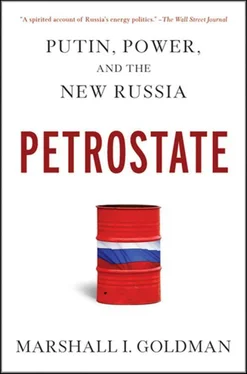Yegor GaidarThe acting prime minister during Yeltsin’s first year as president of Russia. One of the architects of Russian shock therapy.
Viktor GerashchenkoThe head of the Soviet and then the Russian Central Bank.
Vladimir GusinskyOne of the early oligarchs who created Most Bank and Media-Most, which became Russia’s first private TV network. After his NTV network attacked Putin, he was arrested and eventually fled into exile.
Mikhael GutserievThe founder of the oil company Russneft. He was forced to sell the company to Oleg Deripaska after the government issued a warrant for Gutseriev’s arrest.
Ferenc GyurcsanyThe prime minister of Hungary who is torn between joining with Russia or non-Russian groups in building a gas pipeline which would originate in the Caspian and Black Seas and transit through Europe.
Tony HaywardThe successor to Lord John Browne as CEO of BP.
Mikhail KhodorkovskyAnother of the original oligarchs who created the Menatep Bank, which in turn gained ownership of Yukos. Khodorkovsky was subsequently arrested and sentenced to 8 years in jail and Yukos was seized by the state.
Sergei KiriyenkoThe prime minister of Russia from March 1998 until the financial crash of August 1998. Subsequently Putin appointed him the chairman of the Federal Atomic Energy Agency.
Helmut KohlChancellor of Germany from 1982 to 1998.
Alexander KorzhakovA KGB general who in 1985 became the head of presidential security when Boris Yeltsin was president. He was removed from office in 1996.
Konstantin KosachëvChairman of the International Affairs Committee of the Duma.
Alexei KudrinWorked with Putin in the governor’s office in St. Petersburg and later accompanied Putin to Moscow to work in the central government. A technocrat, he eventually became the minister of finance.
Platon LebedevA partner of Khodorkovsky in Menatep and Yukos who was also found guilty of tax evasion and sentenced to jail.
Alexander LitvinenkoA former agent of the KGB who fled to London and was subsequently poisoned.
Andrei LugovoiA former KGB agent who was accused of poisoning Litvinenko and who refused to return to London after he was elected to the Duma as a member of the Liberal Democratic Party.
Alexander LukashenkoThe president of Belarus who some have described as the last dictator of Europe.
Igor MakarovA bicycle champion from Turkmenistan who founded ITERA, which started out as a trading company and at one point became the second largest producer of natural gas in Russia. Its headquarters are in Jacksonville, Florida.
Enrico MatteiCEO of the Italian energy company Eni.
Valentina MatviyenkoThe governor of St. Petersburg.
Alexander MedvedevDeputy Chairman of Gazprom.
Dmitry MedvedevChairman of Gazprom and for a time Director of the Presidential Administration in the Kremlin and subsequently first deputy prime minister, who also worked with Putin in St. Petersburg when he was deputy governor.
Alexei MillerThe CEO of Gazprom who worked with Putin when he was deputy governor of St. Petersburg.
Bruce MisamoreChief financial officer of Yukos, an American who previously worked for Marathon Oil in the United States.
Semion MogilevichA shadowy figure accused by the FBI of criminal activity and being a mafia leader who is thought to be involved in the sale of gas to Ukraine.
Nursultan NazarbayevThe president of Kazakhstan.
Leonid NevzlinA close friend and collaborator of Khodorkovsky who fled in exile to Israel before Khodorkovsky was arrested and Yukos was seized by the state.
Saparmurat NiyazovThe leader of Turkmenistan until his death.
Ludwig and Robert NobelBrothers who were among the first to develop Russia’s oil fields around Baku before World War I and the Revolution.
Nikolai PatrushevHead of the FSB, the successor to the KGB.
Vladimir PetukhovThe mayor of an oil-rich city in Siberia where many Yukos operations were located. After complaining about Yukos’s failure to pay its taxes, he was found murdered.
Evgeny PrimakovA former head of the KGB who was appointed prime minister in September 1998 after the financial collapse and who was removed in May 1999.
Lee RaymondCEO of Exxon-Mobil.
John D. RockefellerOne of the early developers of the oil industry in the United States and the founder of Standard Oil.
Leonid RoketskyThe governor of the Tyumen region who at the same time was chairman of the Tyumen Oil Company.
Rothschild brothersInternational bankers and early investors and developers of oil production in the Baku region.
Mikhail SaakashviliThe president of Georgia who earlier attended Columbia University in New York.
Gerhard SchroederThe chancellor of Germany who promoted the building of Nord Stream, a Russian-German pipeline, and then became the chairman of the board of directors.
Igor SechinA former KGB agent who became deputy chairman of the Kremlin administration while simultaneously serving as chairman of the Board of Directors of Rosneft.
Igor ShuvalovAn economic adviser to Putin.
Oleg ShvartsmanA shadowy figure who runs the $36-billion Finansgroup Investment Fund. This fund is reputed to manage the assets of high-ranking government officials who have funneled government assets into their own accounts.
Alexander SmolenskyAn early oligarch who created the SBS/AGRO bank and with Berezovsky became an owner of Sibneft.
Anatoly SobchakPutin’s professor in law school who became governor of St. Petersburg and appointed Putin as his deputy.
Sergei StepashinThe former head of the FSB who served as prime minister from May 1999 to August 1999 and subsequently became head of the Duma Audit Chamber.
Sergei StorchakThe deputy minister of public finance in charge of administering and investing the country’s stabilization fund. He was arrested on charges of embezzlement in late 2007 as part of what was thought to be an effort by some of the siloviki to gain control of the billions of dollars held in that fund.
Steven TheedeAn American who worked for ConocoPhillips and was later appointed as chief operating officer of Yukos.
Gennady TimchenkoA long-time friend of Putin who with Putin is rumored to share the ownership of Gunvor, a company selling petroleum.
Andrei VavilovA former deputy finance minister who became the predominant owner of Northern Oil, a company he eventually sold to Rosneft for a very expensive price.
Viktor VekselbergAn early oligarch who became a major partner in Renova, which has major holdings in Tyumen Oil. He also became one of the owners of SUAL, one of the country’s aluminum manufacturers. He also financed the purchase of the Fabergé eggs so they could be returned to Russia and paid for the return of the bells of the Danilov Monastery from Harvard University.
Rem VyakhirevThe president of Gazprom until he was not reappointed in 2001. Formerly he was the Deputy Minister of the Gas Industry.
Matthias WarnigA former Stasi Secret Police agent who befriended Putin when they were both stationed in East Germany. Waring later ran the Dresdner Bank office in St. Petersburg and was selected to head the Nord Stream pipeline project in the Baltic Sea.
Читать дальше












